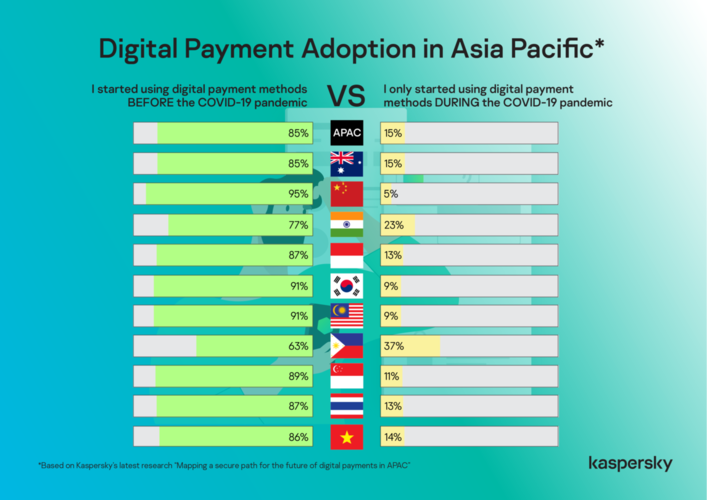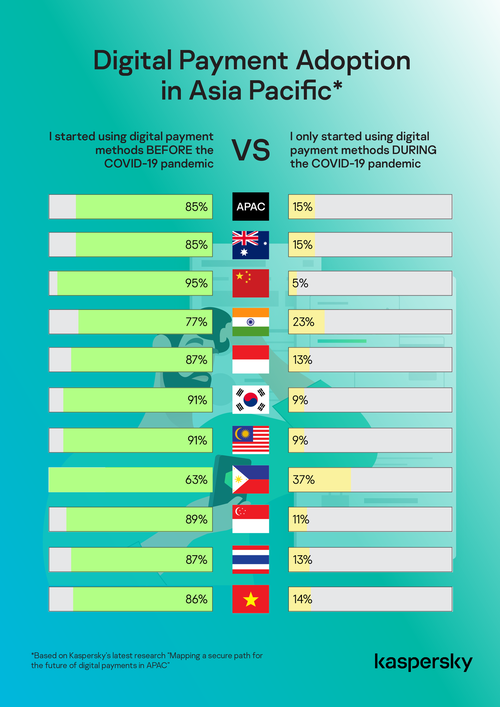
A Kaspersky recent study reveals cash is still king in the Asia Pacific (APAC), but may not be for long as e-wallet and mobile banking adoption are trailing closely behind cash use in the region.
The study, titled “Mapping a secure path for the future of digital payments in APAC,” was conducted by research agency YouGov. Survey responses were gathered in July 2021 with a total of 1,618 respondents surveyed in key territories in the region, including Australia, China, India, Indonesia, Malaysia, Philippines, Singapore, South Korea, Thailand and Vietnam. The respondents are 18 to 65 years old working professionals who are digital payment users.
One of the key findings showed that a majority (90%) of the Asian respondents has used mobile payment apps at least once in the past 12 months, confirming the fintech boom in the region. Nearly 2 in 10 (15%) of which only started using these platforms after the pandemic.
The Philippines recorded the highest percent of new e-cash adopters at 37%, followed by India (23%), Australia (15%), Vietnam (14%), Indonesia (13%) and Thailand (13%).
The lowest number of first-time online payment users are China (5%), South Korea (9%) and Malaysia (9%).
China has been a notable leader in mobile payments in APAC. Even before the pandemic, its top local platforms, Alipay and WeChat Pay, have witnessed significant mass adoption and served as an example to follow for other Asian countries.
According to Kaspersky, safety and convenience triggered more users in APAC to embrace financial technologies. More than half of respondents said they started using digital payment methods during the pandemic as it is safer and more convenient than making a face-to-face transaction.
Kaspersky Asia Pacific managing director Chris Connell said purchases or retail transactions were still made in cash but these days could be numbered, however, as digital payments are on the rise.
“Data from our fresh research showed that cash is still king, at least for now, in APAC with 70% of the respondents still using physical notes for their day-to-day transactions.
“However, mobile payment and mobile banking applications are not far behind with 58% and 52% users utilizing these platforms at least once a week up to more than once a day for their finance-related tasks.
“From these solid statistics, we can infer that the pandemic has triggered more people to dip their toes into the digital economy, which may fully dethrone cash use here in the next three to five years,” he said.
Respondents also cited that these platforms allowed them to make payments while adhering to social distancing (45%) and that these are the only way they can do monetary transactions during the lockdown (36%).
When asked about reservations prior to using mobile banking and payment apps, first-time users admitted their fears – afraid of losing money online (48%) and afraid of storing their financial data online (41%). Almost 4 in 10 also revealed they do not trust the security of these platforms.
“It is a welcome finding that the public is aware of the risks that comes with online transactions and because of this, developers and providers of mobile payment applications should now look into the cybersecurity gaps in each stage of the payment process, and implement security features, or even a secure-by-design approach to fully gain the trust of the future and existing digital payment adopters,” added Connell.

Kaspersky Asia Pacific managing director Chris Connell said purchases or retail transactions were still made in cash but these days could be numbered, however, as digital payments are trailing closely behind.
“Data from our fresh research showed that cash is still king, at least for now, in APAC with 70% of the respondents still using physical notes for their day-to-day transactions.
“However, mobile payment and mobile banking applications are not far behind with 58% and 52% users utilizing these platforms at least once a week up to more than once a day for their finance-related tasks.
“From these solid statistics, we can infer that the pandemic has triggered more people to dip their toes into the digital economy, which may fully dethrone cash use here in the next three to five years,” he said.
Safety and convenience triggered more users in APAC to embrace financial technologies. More than half of the respondents said they started using digital payment methods during the pandemic as it is safer and more convenient than making a face-to-face transaction.
Respondents also cited that these platforms allowed them to make payments while adhering to social distancing (45%) and that these are the only way they can do monetary transactions during the lockdown (36%).
When asked about reservations prior to using mobile banking and payment apps, first-time users admitted their fears – afraid of losing money online (48%) and afraid of storing their financial data online (41%). Almost 4 in 10 also revealed they do not trust the security of these platforms.
“It is a welcome finding that the public is aware of the risks that comes with online transactions and because of this, developers and providers of mobile payment applications should now look into the cybersecurity gaps in each stage of the payment process, and implement security features, or even a secure-by-design approach to fully gain the trust of the future and existing digital payment adopters,” added Connell.
To help users in APAC embrace digital payment technologies securely, Kaspersky experts advise the following:
- Beware of fake communications, especially when it comes to requests for financial information and payment details.
- Use own computer and Internet connection when making payments online.
- Do not share passwords, PIN numbers or one-time passwords (OTPs) with family or friends.
- Adopt a holistic solution of security products and practical steps to minimise the risk of falling victim to cyber threats and to keep financial information safe.








